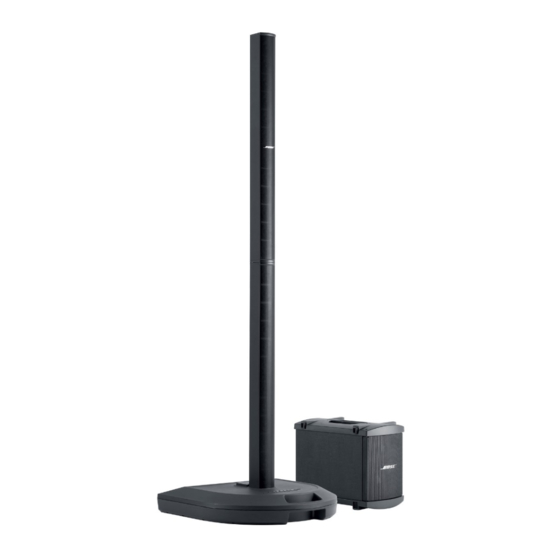Bose Personalized Amplification System Panduan Pemecahan Masalah - Halaman 9
Jelajahi secara online atau unduh pdf Panduan Pemecahan Masalah untuk Penguat Bose Personalized Amplification System. Bose Personalized Amplification System 50 halaman.
Juga untuk Bose Personalized Amplification System: Panduan Pemilik (28 halaman)

THEORY OF OPERATION
Relay DSP information to Remote
The DSP needs to transfer the clip state, channel volume data (cause the table for channel
volume in the DSP), and the system working status to the MCU. The communication adopts
software simulation UART, with two I/O pins as RX and TX. The communication rate is 4800bps,
add a start bit and stop, so every sending byte has 10 bits. Data is sent according to frame
format: frame head | every data | check sum. DSP will transfer a frame every 100ms, and every
sending will take about 15ms.
The MCU needs to transfer the clip state to the Remote. The communication adopts hardware
UART. Communication rate is 9600bps, Data is sent according to the MIDI protocol: MIDI chan-
nel number | MIDI parameter type | MIDI parameter value. The DSP will transfer a frame data
every 100ms, and every sending will take about 3.5ms.
Relay Remote information to DSP
The remote needs to transfer the Ch1EQHi, Ch2EQHi, Ch1EQMi, Ch2EQMi, Ch1EQLo,
Ch2EQLo, Ch1Volume, Ch1Volume, and the MasterVolume to MCU. The communication adopts
hardware UART. Communication rate is 9600bps, Data is send according to MIDI protocol: MIDI
channel number | MIDI parameter type | MIDI parameter value. DSP will transfer a frame data
every 100ms, and every sending will take about 30ms.
The MCU needs to transfer the Ch1EQHi, Ch2EQHi, Ch1EQMi, Ch2EQMi, Ch1EQLo,
Ch2EQLo, Ch1Volume, Ch1Volume, MasterVolume, Ch1Preset, Ch2Preset, BassChk, and the
CheckSum to the DSP. The communication adopts software simulation UART, with two I/O pin
as RX and TX. Communication rate is 4800bps, add start bit and stop, so every sending byte
has 10 bits. Data is send according to frame format: every data | check sum. DSP will transfer a
frame every 100ms, and every sending will take about 30ms.
Control channel volume IC
Because the design requires that the channel signal could change from –40dB to 0dB, we use a
volume control IC. There are three pins used to control the volume control IC: CLK, DATA, STB.
CLK, DATA and the STB time sequence is implemented by software.
Check channel preset switch
In the audio processing, there is a parameter equalizer, and the system supplies 100 sets of
coefficients for this function. A user could choose a different coefficient to get different sound
effects. This channel preset switch is a user interface to provide the function for choosing a
different coefficient.
Check bass send state
There is a bass-line out plug on the input panel. Through this plug, the system can connect to
additional power stands to drive additional bass modules. The bass send state only has two
logic states "0" or "1", indicating unconnected and connected. Different states will choose differ-
ent coefficients for the limiter and the system equalizer.
Check power & amplification protection
When the power supply and amplification have a problem, the system will indicate this to the
user by an LED on the input panel. The power & amplification protection signal also only has two
logic states "0" or "1", indicating unprotected and protected.
9
